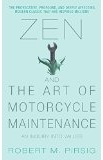Technology 4
Pirsig was discussing a bike shop in which they screwed up his bike with incompetence and disinterest. Because he was interested in investigating quality he looked in a certain direction – a legitimate ploy, but he did not analyse the dominant factor – profit. Back in the 60s and 70s matters were less clear cut than they are now. I suggest that few young people would even consider quality as an issue. There has been a redesign (in the Japanese offices), bikes are now made of assembly kits, the company trains the mechanics, the company makes the profits from maintenance and then fixing bikes, and the quality craftsman has died – the artist is dead.
Competence and interest were the two factors that made up the quality care of the bike, Pirsig wanted to examine a situation where these factors could be, or even should be, found in a mechanic. He bemoaned the fact that 9-5 mechanics switched off with the clock. Driven by the profit motive the companies recognised the reality that a drive for profit is incompatible with quality, quality and interest takes time. Puzzling out that the 25 cent oil-delivery system pin had snapped had no profit, even 100% profit could not motivate such a pin. So there are chunks of kit that work, that can be replaced, that can be made by the company, and whose failure can be found by a computer and thus profit the company.
Investigating into this is worth considering beyond motorcycles, the companies needed to break the human connection. What would happen if we found a mechanic who was competent and interested, the owner would go back to him – there would be an allegiance with the trusted mechanic. Companies brand this as customer loyalty but rather then it being trust in the mechanic they want it to be trust in the product – the company’s product. Companies do not want trust in people, then they don’t have control – no profits. If there is a small mechanic in your area that you trust, he is taking business from the company, they must swallow up his business. Maybe this guy knows when not to buy genuine parts, that the pirate parts won’t harm the functioning of the vehicle. But the more important factor for the companies is that the want to swallow up competence, not to make them more competent but to remove the competition because they want product loyalty rather than human allegiance. Competent and interested humans are anathema to companies.
There is another important word that comes with the profit motive, competence and disinterest comes from alienation. 9-5 mechanics, however well they followed the manuals, were probably alienated from their job. This word is so important when considering work. When a bike is fixed who gets the profit? On a factory belt who gets the profit? The owner makes the profit and gives some of it back to the worker as wages, if the owner wants to get more profit or if the business is not doing so well he wants to reduce the wages. There is some connection between profit and allegiance, a customer will come back to that mechanic if s/he is satisfied and so the owner’s profits will be increased but will the owner say to the mechanic to spend time developing that allegiance? Or will they say you have spent too long on that job, time is money, and force the mechanic to skimp on the job to fix more motorcycles?
This is a dilemma owners don’t like, it means they are forced to rely on their staff. Now in some small businesses there is much more of a symbiotic relationship between the owner and staff. The owner treats the staff well because they know that good staff promotes the business and therefore increases the profits. The owner recognises the need for competence, and so works with the staff to keep them interested. But this is rare and is getting rarer. And it is not a corporation practise. And again competent small businesses are swallowed up to get rid of competition.
Because of corporate domination our society is moving away from the competence and interest of the individual to company slavery, how can you expect competence with slavery? There is a delusion that is created so that this reality is not confronted, we choose our work and they give that delusion the word “career” – we choose our careers. At school we have careers lessons and young people choose what they want to do. But the choice is this, which slavery do you want? And then these slave-owners complain about the quality of the work!!!





